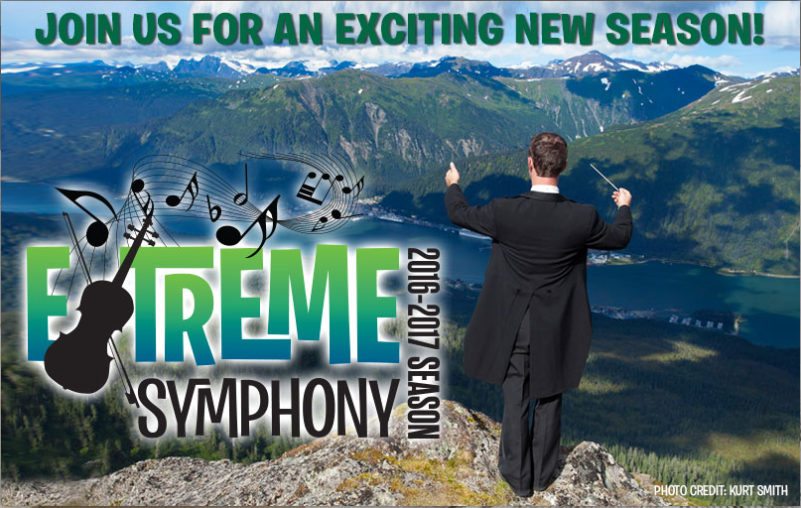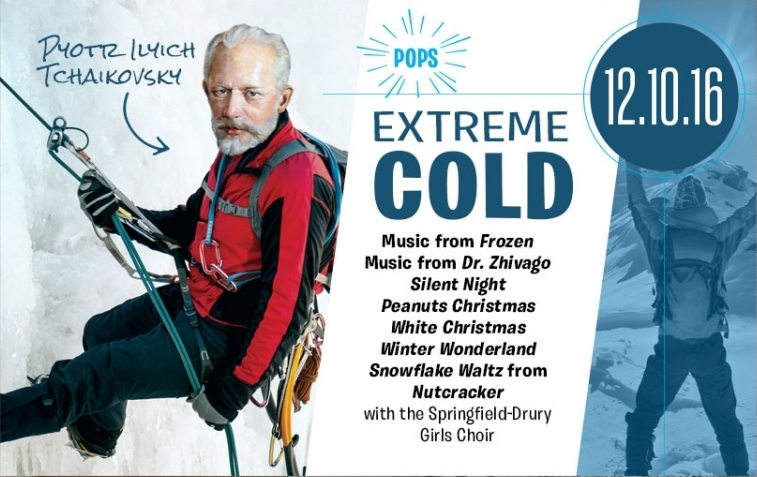
When you think of music and the Ozarks (don’t deny it… we both know you do, and often), your mind probably heads in one of two directions. Perhaps you’re old enough to remember and understand the historical significance of the Ozark Jubilee, the first network television program to feature the day’s top country music acts. Or, maybe you think of Branson, Missouri, and it’s famed 76 Strip, a mashup of the Nashville sound with Vegas-like attractions and live shows.
Nearly two and a half decades before the Baldknobbers first opened their doors in Branson, and still going strong more than five and a half decades after Ozark Jubilee signed off the air from Springfield for the last time, the Springfield Symphony Orchestra has brought classical and popular instrumental music to the Ozarks. Founded during the height of the Great Depression in 1933, and now in its 82nd season, the symphony, led by Music Director and Conductor Kyle Wiley Pickett, has taken its programming to the extreme. Inspired, in part, by the symphony’s October pops performance “Extreme Galactic Adventure”, which featured scores from science fiction television and films, I sat down with Conductor Pickett to talk about how he uses his geek culture influences to bridge the gap between classical and popular pieces and expose instrumental music to a broader and younger audience.
Pickett is a native of the California Bay Area. Growing up the son of a classical musician, piano instructor, and elementary school music teacher in the Bay Area in the 1970s, Pickett was exposed to a wide range of live musical performances. “My parents took me to everything, honestly.” That exposure was critical in forming his early appreciation for music, live music in particular.
“There was a group called Scholar Opera that did two hour operas. The great operas, but in English and cut down to two hours. As a kid, it was awesome. The opera stories are fantastic. They’re just as good as any movie. You know, it’s all death and destruction. As a seven year old going to Faust, you think, ‘No way,’ but it’s–you totally get it.”
“My dad, he was into Pete Seeger, The Weavers. So, they took me out to San Francisco to see Pete Seeger at Stern Grove. I’m sure there was a big cloud of pot smoke, but as a kid, I didn’t know.”
“We’d see folk music, we’d see classical music, we’d see opera. Popular music. So, I got a lot of exposure.”
Those of us of a certain age will remember that as a time before home video or streaming services, which meant that cultural experiences happened live, at the venue. Pickett points out that even in spite of the limited technology of the era, there were still opportunities to be moved by cultural phenomena at home.
“I remember my best friend, for Christmas in ’77, got the LP of Star Wars. He and I wore that record out. That still has to be one of the greatest soundtrack albums ever. Probably the greatest soundtrack album ever. We wore that record out so much that his dad made us cassette tapes of it so we could still play the cassette and listen to it over and over again. 1978, I’m seven years old, I love Star Wars, but you have to go to see it, right? We don’t even have video cassette recorders for a couple more years. So, the way you relive the movie is by listening to the soundtrack. We had all our Star Wars figures, and we’d listen to the soundtrack.”

Pickett lets his love of geek culture flow through his programming choices as Music Director. This season, the Springfield Symphony Orchestra is presenting a series of “extreme” concerts, including the October 2016 pops concert “Extreme Galactic Adventure,” which featured a mix of classical pieces with scores from sci-fi film and television properties. It is all a part of Pickett’s plan to broaden the reach of the symphony and bring it to a non-traditional audience.
“I’ve doing this for 18 years, and my experience has been with people, especially of our generation, that they’ll say, ‘Oh, I’m not really into classical music.’ But, when you get them there, they love it. Even if it’s something they’ve never heard before. Even if it’s hardcore classical like Brahms or Mahler or something like that. You get them there, they’re sitting in the hall, they’re going to have a good time.”
“In the classical music world, we have to do two things. We have to capture the imagination of people who are not already inclined to go. We have to capture the imagination of someone who’s never thought about going to the orchestra. That’s just not something they’re thinking about. Then we have to convince them that it’s relevant to them. If I can say, look, Mahler wrote a symphony about a guy who comes from nature and he has to explore the world and he confronts death and he confronts love… it’s all the stuff that we confront. I mean, all of us do it. We all have to deal with death. We all have to deal with love. We all deal with ‘Where’s my place?’ He (Mahler) put it into music. Someone, even if they don’t know anything about Mahler or the orchestra, can come to one of these concerts and they’re going to get that. They’ll be confronted by those questions in the way that Mahler framed them.”

“There’s something in this classical music–and it’s not exclusive to classical music, there’s folk music, there’s pop music, there’s rock music–all of the ones that last, speak to us very deeply inside. There’s value in coming together live to hear that.”
The value in exposure to music is most evident in children, which, as a parent, is clear to Pickett. “We can’t underestimate kids, and I think we often do underestimate their capacity for what they want to hear.” As a parent observing the way that his own sons, ages ten and seven, take in music and the role that evolving technology plays in their music consumption, Pickett’s approach to exposing children to music has changed. “They don’t have to get the whole thing right away. If they want to listen to five minutes of a Beethoven symphony, or three minutes of a Beethoven symphony, that’s great. We don’t have to make them listen to 30 minutes of a Beethoven symphony. Kids learn in snippets.”
“Once we’re adults, we think we have to tackle the whole thing. When I was first doing kids concerts, I was like, ‘Okay, I want them to come out learning this and this and this.’ Now when I do a kids concert, I have two goals, and anything else is just gravy. My number one goal is I want kids to leave saying, ‘That was pretty cool. I’d like to go back sometime.’ If that doesn’t happen, nothing else you do matters at all. They might leave knowing that Mozart lived in the 18th century, but if they hated it, who cares?”
“My number two goal is that I would like them to say, ‘I really would like to play an instrument.’ For our kids concerts. I do small pieces, they’re short, or I’ll do a small segment out of a longer piece, and I just do a bunch of them, of different styles, and have a couple different ways they’re introduced.”
Again, exposure is key.
“You know, my kids have created these big Spotify playlists, because it’s pretty easy for them to look up a piece and add it to their list. They do things on their Spotify playlists that drive me nuts. But, I figure, if that’s the way they’re consuming it, it’s great. Like, my son would put one of the pieces from The Force Awakens–‘March of the Resistance’–twenty times in a row on his playlist. That drives me nuts. You hear it go again and again and again. The other thing they’ll do is they’ll put a bunch of different songs and they’ll play twenty seconds of one, then they’ll skip to the next and play fifteen seconds of it, and they’ll go back. But that’s fine. One of the things I’ve seen that happens from that is they are making musical connections that I’ve missed. They’ll come up and say, ‘Hey, this little part… did you hear this little part, it sounds the same as this other part,” which is actually pretty sophisticated musical understanding.”

Part of getting kids interested in music, particularly younger children, is finding the right balance of silly and sophisticated. To that end, Pickett has worked with a friend and former classmate at Stanford, Cory Cullinan, who performs under the name Dr. Noize, to put together a multimedia adventure designed to introduce children to the elements of the symphony. The Ballad of Phineas McBoof tells the story of a monkey that creates an orchestra of assorted characters. Years in the making, Phineas McBoof is available as an iOS ebook/app, a music album available on Amazon and on iTunes, and a hardcover children’s book.
“Just capture their imagination,” concluded Picket. “Then, wherever it goes, that’s great. If you have an end goal of ‘I want to make them a professional musician,” you’re going to be disappointed a lot of times. But if you just say, ‘I want them to have a love for this, and wherever that leads…’ You know, my kids love the soundtrack stuff. I could see them being involved in film music somewhere. Maybe. I don’t know. But there’s an interest there. Or maybe not at all, and just appreciate it. Or they could surprise me. I don’t think my parents thought I was going to be a conductor.”

The Springfield Symphony Orchestra’s next performance is scheduled for Saturday, December 10. The annual Home for the Holidays matinée begins at 2:30 pm, with the next concert of the season–“Extreme Cold”–set for 7:00 pm. You can find the Springfield Symphony Orchestra online and on Facebook. Conductor Pickett can be found online and on Facebook. Dr. Noize can be found online and on Facebook as well.
